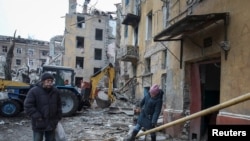On January 30, China’s Foreign Ministry hit back at U.S. accusations that some Chinese state-owned companies have been providing “non-lethal military assistance and economic support” to Russia for its war in Ukraine.
Mao Ning, the ministry’s spokesperson, dismissed the accusation as “groundless blackmail” and said that China “always stand[s] on the side of peace” and “would never add fuel to the fire.”
Accusing the U.S. of “sowing paranoia and pointing fingers at China,” she pointed a finger at the U.S.:
“The U.S. is the one who started the Ukraine crisis and the biggest factor fueling it…”
That’s false.
This is not the first time China has blamed the United States for the Russian invasion. Since Russia launched its all-out war against Ukraine in February 2022, China has yet to condemn Russia for its aggression and avoided labeling it an invasion. Meanwhile, its foreign ministry and state-backed media, dovetailing with the Kremlin, have repeatedly referred to the U.S. as the Ukraine war’s "leading instigator" and “culprit.”
On February 24, 2022, the day Russia launched its full-scale invasion, China’s assistant Foreign Minister Hua Chunying accused the U.S. of leading the “NATO expansion eastward all the way to Russia’s doorstep,” adding: “Did it ever think about the consequences of pushing a big country to the wall?”
The Chinese Communist Party’s No. 3 official, Li Zhanshu, said in September that “the United States and NATO directly forced their way onto Russia's doorstep.”
“[I]t can be said that Russia was forced into a corner, and under such circumstances, Russia took a counterattack to safeguard the core interests of the country,” he said.
China’s state broadcaster CGTN also repeated Russia’s claim that the U.S broke its “promise to Russia against the eastward expansion of” NATO.
Polygraph.info has previously debunked both claims.
First, there is no written record of any pledge made by the United States or its NATO allies not to extend the alliance eastward beyond what was then West Germany.
Russia has repeatedly claimed that former U.S. Secretary of State James Baker had “verbally” made such a promise to then Soviet leader Mikhail Gorbachev during the 1990 negotiations that led to German reunification. However, both Baker and Gorbachev have denied that such a pledge was made.
Baker told The New York Times in a 1997 interview that “he never intended to rule out the admission of new NATO members.”
Gorbachev confirmed the proposal was made in the context of German reunification.
He stated in an October 2014 interview with state-owned Russia Beyond the Headlines (now Russia Beyond):
“The topic of ‘NATO expansion’ was not discussed at all, and it wasn’t brought up in those years. I say this with full responsibility. Not a single Eastern European country raised the issue, not even after the Warsaw Pact ceased to exist in 1991. Western leaders didn’t bring it up, either.”
Second, it is misleading to say that NATO enlargement after the Cold War and Ukraine’s potential NATO membership threatened Russia’s security at its “doorstep,” and that Russia was therefore compelled to “counterattack” by invading Ukraine.
There is no evidence that NATO, a defensive alliance, sought war with Russia.
As Polygraph.info previously reported, the following facts undermine Russia’s claim that it invaded Ukraine to defend itself from security threats posed by NATO “encirclement.”
· Ukraine removed its legal prohibition against joining NATO only after Russia annexed Crimea and took other aggressive actions against Ukraine in 2014.
· A September 2022 Reuters report showed that Ukraine, as the invasion began, had offered to take future NATO membership off the table in exchange for peace. Putin rejected the plan and expanded his war instead.
· Putin has telegraphed his imperial intent, consistently denying Ukraine’s legitimacy as a sovereign nation.
· Moscow’s aggression prompted Finland and Sweden to seek NATO membership, and Russia’s response was muted.
· It is Russia’s actions that prompted NATO countries to beef up their defenses.
The United States and its NATO allies tried to stop the Russian invasion by extending diplomatic channels for crisis talks. Putin pressed on with war, a move that allegedly even caught Beijing off guard.





